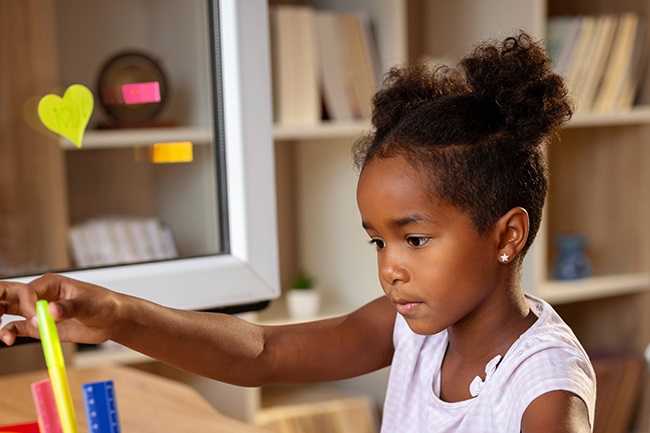
- Learning disabilities in children still have some stigmas attached to them with parents blaming themselves or wishing for a ‘normal’ child.
- It’s important to get support and celebrate your child’s strengths while helping them with their learning disability.
- Look out for disorders like ADD, ADHD as well as auditory and visual processing disabilities.
Kids today face so much pressure academically and it can be hard for them to to articulate what they’re feeling or struggling with.
Public schools have currently concluded their first term, and it’s important to take note of your child’s performance and if they need any extra support ahead of the start of the new term.
While school is no walk in the park, some children struggle much more than others. This is where learning disabilities come in.
Learning disabilities are disorders that affect the ability to understand, speak, or read language, do mathematics, and coordinate movements and functions. Although South Africa adopted a policy of inclusive education in 2001, research shows that overcrowding, time constraints and lack of parental involvement impacted the inclusion of students with learning disabilities in the classroom.
READ MORE | It takes a village – 9 tips for new parents to maximise their parental leave
Learning disabilities are genetic and Jonathan Hoffenberg, social worker and PACES manager at The Parent Centre, explains to TRUELOVE that other factors like premature birth, exposure to alcohol, drug, toxins or infections during pregnancy can contribute.
Learning disabilities like dyslexia, dyscalculia and dysgraphia all affect children’s reading and language processing, their ability to understand mathematical concepts or their ability to write.
Saying goodbye to the stigma
No parent wants to be told there’s something negatively affecting their child and learning of the diagnosis can trigger feelings of guilt.
Sharing why he believes there are still some stigmas attached to diagnosing learning disabilities, Jonathan says, “Many parents can be in denial about learning disabilities, they may think it is just a stage that the child will grow out of, or that the child is being lazy or naughty.
“Some parents even dispute that disorders like Autism or ADHD (attention-deficit/hyperactivity disorder) even exist, I have met teachers who feel that ADHD does not exist. All these factors can make parents hesitant to want their child diagnosed. Lastly there is the cost, a number of the sensory learning disabilities need specialist testing and trained professionals to identify.”
Understanding that learning disabilities aren’t linked to intelligence or motivation is the first step in eradicating any shame or stigma attached.
READ MORE | Dealing with a child that is acting 'mean'? 5 tips to teach kids kindness
- Recognise that it is not their fault, they are not being stubborn or naughty.
- Children with disabilities know they are different and can at times be teased, shunned and made to feel broken. Parents need to assist their children with the impact of the disability as well as the actual disability itself.
- Get respite and support from your family and friends. This can sometimes mean finding other parents with similar issues. Raising a child with a disability can be lonely and raises complex feelings of guilt and anger.
- Celebrate the victories but recognise the defeats as well. Be honest and open with your children about their disability as people often downplay or are not totally truthful with children because they may be embarrassed or feel pity.
- Find the things that they are good at, celebrate the strengths and hold onto what works for you and your child that makes them feel loved, supported, empowered, and makes you both happy.
- Know yourself and your stress levels and rather take a break from activities to allow yourself and your child to reset than push through and end up upset yourself and with an upset child. This is not a race or a competition this is about you and your child.
Learning disorders to look out for
ADD (attention deficit disorder)
While ADD and ADHD are not strictly classed as learning disabilities, ADD and ADHD are neurological conditions with symptoms of inattention, distractibility, and poor working memory.
“ADD children and adults have trouble focusing on schoolwork, they are forgetful, lose track of time, have poor working memory and executive function,” Jonathan explains.
“The last two can present as not following instructions or finishing a project, struggling to organise tasks, losing focus when doing complex tasks, and at times a lack of “common sense”, for example, it looks like rain but an ADD kid will not think it through to meaning they need to pack a raincoat.”
ADHD (attention deficit/hyperactivity disorder)
When it comes to ADHD, Jonathan says, “ADHD shares the characteristics of ADD but add fidgeting, bursting with energy, lack of impulse control (not waiting, taking risks, getting bored easily and then seeking attention or stimulation), ADHD kids can be talkative and impulsive compared to the quiet more dreamer ADD kid.”
Auditory and visual processing disorders
Jonathan explains how, “Auditory processing disorders affect the processing of sounds. A child's ears may be fine, but the brain struggles to filter and differentiate sounds. A child may confuse the order or source of sounds and may struggle to hear a teacher's voice against background noise.
“This can present as a language processing disorder where the child struggles to attach meaning to sound groups that make up words and sentences. Individuals with visual processing struggle to interpret letters into language.”











